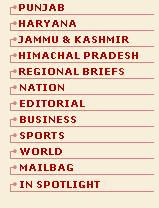JAMMU, Aug 26 — Conflict and confusion persist among various security agencies in J&K affecting anti-militancy and anti-infiltration operations.
On several occasions mediamen too have been witness to the clash of egos between the Army and the BSF. While the former has been treating the latter as a subservient force as the BSF is under the operational command of the Army, the BSF is, in turn, anxious that the army not take credit for anti-insurgency operations launched by it.
So in Samba, R. S. Pora and Rajouri sectors the BSF authorities were taken unawares recently when the Army flashed news stories regarding killing of militants by its troops. In fact the groups of militants had been killed in several operations along the international border and in Rajouri sector in operations predominantly involving the BSF.
It was the result of one such clash of egos that a group of newsmen found themselves in the illegal custody of the Army authorities while returning from a visit to the international border. The newsmen had sought prior permission from the BSF authorities, but the army authorities refused to honour the BSF permit. Under the rules the international border from Kathua to Akhnoor is manned by the BSF and permission for visiting the border from the BSF should have carried weight. But the Army authorities ignored this saying “the BSF is under our operational command.”
The J&K police too is not above scoring points over the Army or the BSF. In joint operations carried out by the security forces including the police, whenever militants are killed the police is quick to take credit. This, they have learnt from the Army, which does not like to share honours either.
The major irritant for the police though is the “failure” of the Army and the BSF in reducing the rate of infiltration and arms smuggling. Police authorities said that during the past three months more than 900 Pak-trained militants have sneaked into Jammu and Kashmir and over 150 Kashmiris, including over 50 girls, have crossed over to Pakistan occupied Kashmir for arms training.
But the police and Army authorities themselves differ widely on the rate of infiltration, though the police and BSF authorities maintain monthly figures on ingress and exgress.
The police, with its better communication network, can come out with reports on encounters and militant strikes more quickly while the Army and BSF are forced to adopt a hush policy about their reports as these must first be cleared by the corps or div. commanders.
These delays have rendered the Army’s media centre at Nagrota redundant despite it maintaining that reports of militancy related violence or border trouble will be fed to newsmen primarily from its Nagrota media centre. In fact, whenever such incidents take place newsmen receive message from the Army authorities of various areas. This lack of coordination between Romeo Force, Delta Force, Rashtriya Rifles and the BSF commands results in confusion and at times, contradictory reports.
Thus it has been often seen that reports of border firing by Pak troops and Indian retaliatory fire travel from Poonch to Jammu or to the Nagrota media centre at a snail’s pace. Recently reports of the border incident at Poonch reached Nagrota after 14 hours. The killing of two militants near Banihal reached the Army’s media centre after 10 hours. Even when the reports reach the centre in time it can still take more than four hours to prepare a single paragraph of media briefing.
To get around this the BSF and the Army usually pass on information about encounters and border trouble to select news agencies and newspapers, as they do not have a complete record of phone and fax numbers of newsmen.
The result is that figure of killing of militants or infiltrators vary from newspaper to newspaper and between the print and electronic media. Pakistani agencies cash on these weaknesses to twist the facts and present them with a pro-Pak slant advancing its cause at the squabbling Indian agencies expense.


